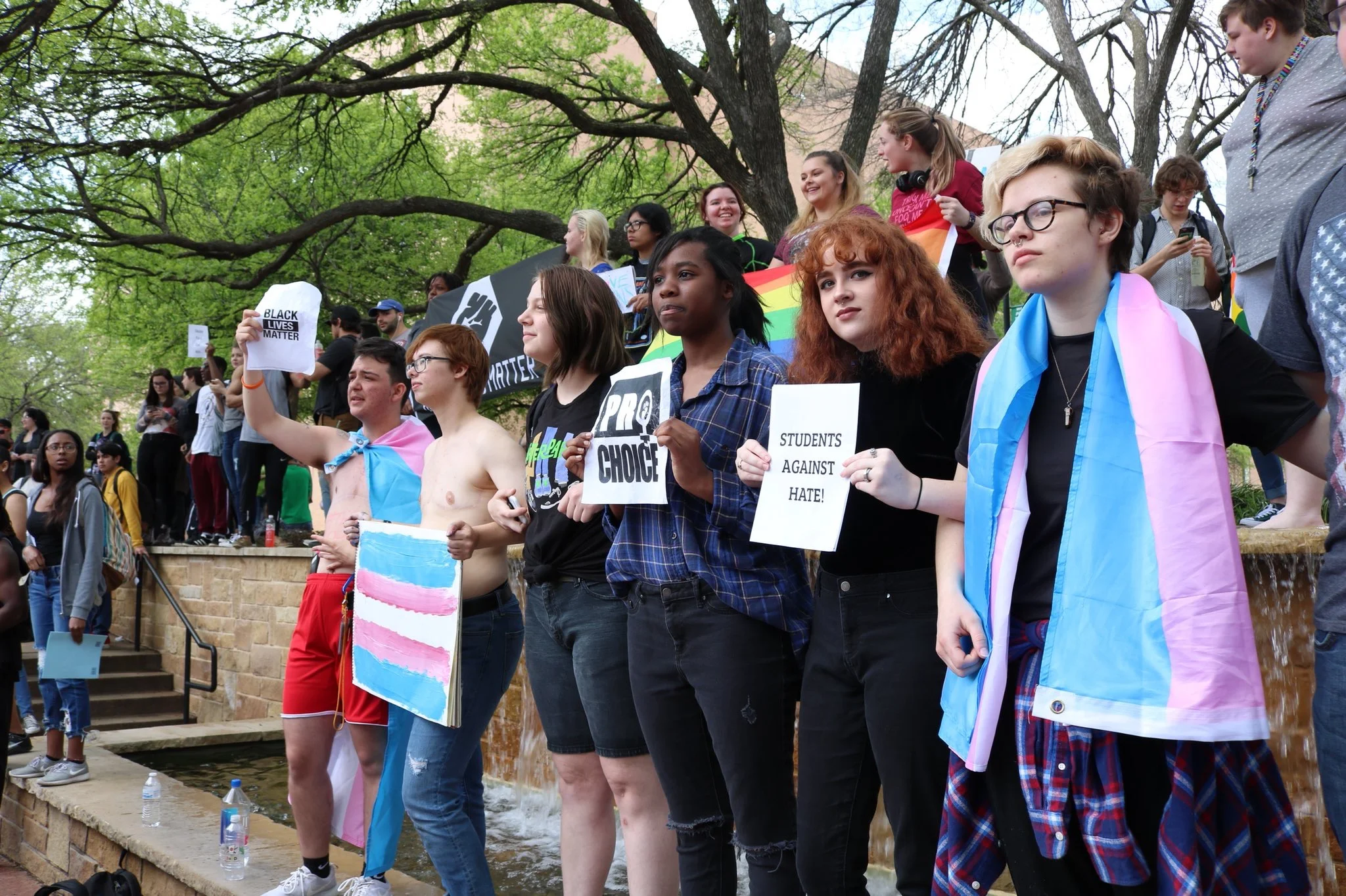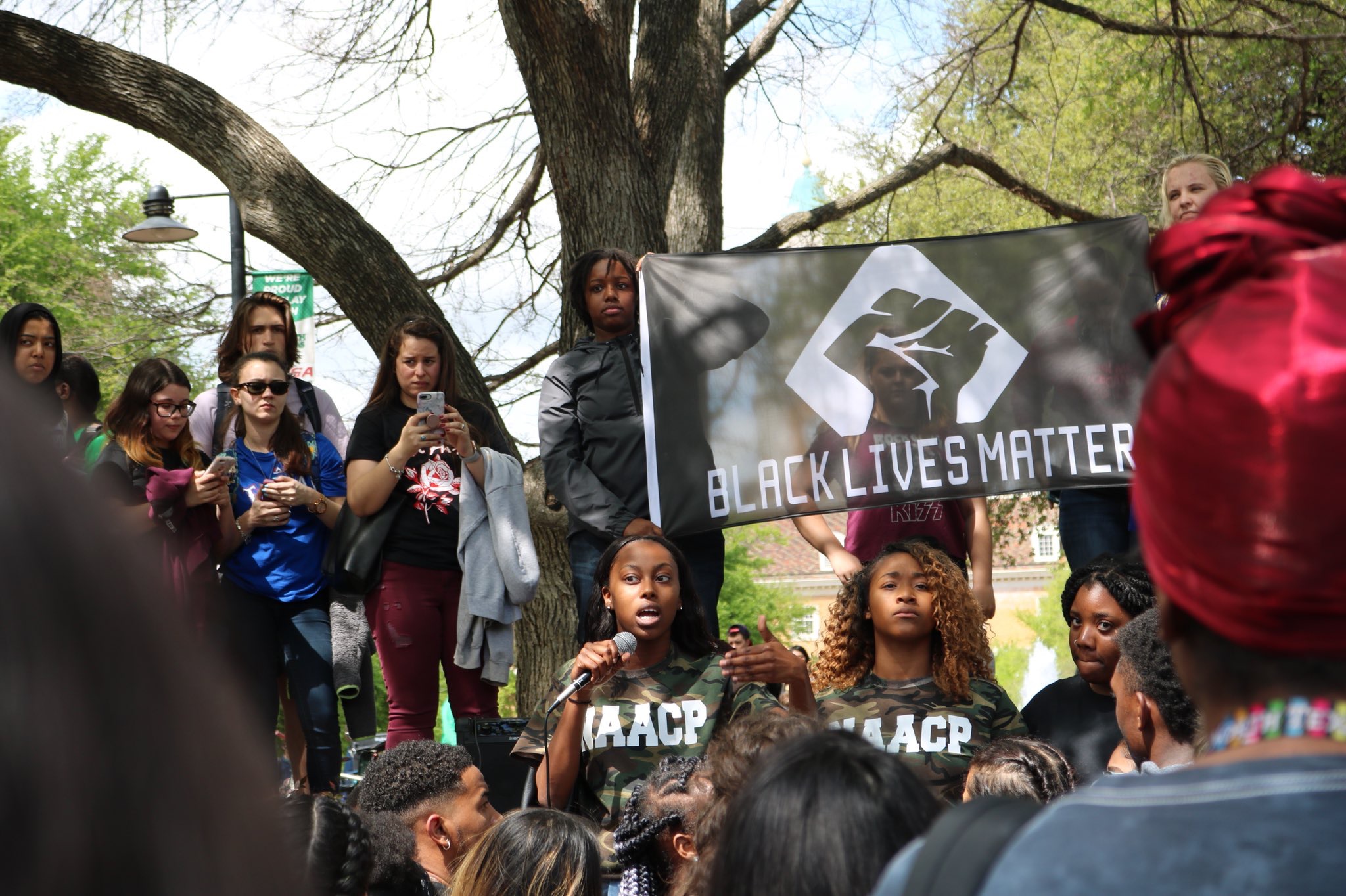Editorial: Denton Activism Has a Long Way to Go
When Donald Trump was elected president, it sparked a widespread movement of people who opposed him, leading to the organization of hundreds, if not thousands, of marches and protests across the country. This is, at face value, a good thing. Important social issues were getting more attention than they had in a long time, and new life was breathed into those dedicated to combating injustice. However, as activism and protests became more common, garnering more and more participants, performative activism and allyship, as well as white feminism, became pervasive.
These phenomena hurt and further disenfranchise the people these movements are supposed to help, as their voices are spoken over and ignored. White and cis women claiming to be feminists ignore the deeper, more complex struggles of women of color and trans women. Those speaking on mass shootings disregard the over-representation of people of color, particularly Black Americans, as victims of gun violence. People post photos of themselves at marches on social media but do little to uplift the marginalized people in their lives, or they don't speak up for them in their absence after the rally is over. This is a problem plaguing activism around the world, and Denton is no exception.
On March 24, thousands of people marched around the country in solidarity with the survivors and victims of the recent shooting at a high school in Parkland, Florida. One such march happened right here in Denton, organized by resident Parker Hicks, in which students, parents, teachers, and local politicians gave a myriad of speeches, disavowing loose gun laws and encouraging people to go vote. However, something overall seemed to be missing..
There was little discussion of gun violence outside of schools, the disproportionate gun violence affecting communities of color, or the larger cause of mass shootings beyond accessibility of firearms. There was even a distinct lack of people of color at the event, something noted by legal advocate Janata Montgomery who took the mic and said, "I don't see a lot of people of color out here. We are the primary victims of gun violence. I represent all of you. I need you to be here for my people too."
Ultimately, the march fell short, barely skimming the surface of gun violence, and seemed to be little more than an event where local politicians could remind citizens to vote for the right people (in short, themselves). Unfortunately, this is unsurprising. Most of the attendees were statistically unlikely to be victims.
They were mostly white, seemingly affluent residents of suburbia, where gun violence seldom touches. Because of that, beyond an entirely valid fear of a mass shooting where they live, they have little concern about gun violence on a larger scale, and likely found the march to be perfectly adequate, and went home patting themselves on the back for attending, but will ultimately abandon or forget about any further effort to make a change; with the exception of voting or attending the next performative march that strikes their fancy.
This is something that’s been an issue within the larger discussion on gun violence as well, not just Denton. The rhetorical question has been posed: why did it take the deaths of students in an affluent, mostly white suburb before the country really started paying attention? What about black youths, who have been rallying for years against police violence? Why aren’t we listening to the black students of Stoneman Douglas High School, who have said they feel ignored and excluded from the conversation?
The discussion of an issue that mostly affects people of color is being taken away from them, and because of this their needs and concerns are being ignored. This isn’t new; however; as I said earlier, more and more marginalized people are pushed out of movements they created for themselves.
Take, for example, the Women’s March. Started as an act of resistance against the election of President Trump, it seemed at first to be a widespread show of solidarity between and for all women. However, in the days following the march, scores of women expressed feeling ignored and disenfranchised. Women of color gave examples of racism and microaggressions they had faced at the hands of the white women in attendance, and trans women pointed out the cissexism and hypocrisy of pussy hats and slogans/imagery centered around genitalia. At the second Women’s March in Denton this January, speaker Jessica Zeigler attempted to address the issue of police violence towards women.
In a country with increasingly militarized police, and a town where the police department is well-known for disappointing female victims of sexual assault and domestic violence, at a March with a heavy police presence, this is an important conversation to be had. However, she was heavily booed. The last sentence she said before omitting a large portion of her speech was, “If we have listened to the women of Black Lives Matter, or Mothers Against Police Brutality, we would know that cops are a source of violence for many women, not a solution to it.” Even if people in the crowd took issue or disagreed with the sentiment. The fact that a woman, speaking on a women’s issue at the Women’s March received so much immediate and negative feedback that she felt the need to stop is indicative of a deeper issue in which those in positions of power refuse to even consider the perspectives of others.
Beyond this is a tendency for privileged people to trivialize social issues that don’t directly affect them, sometimes under the guise of solidarity and allyship. Last Thursday, members of the National Street Preacher Conference in Arlington showed up in the UNT campus to protest; carrying hateful signs with racist, sexist, anti-lgbt+, and islamaphobic rhetoric. Not long after they arrived, students showed up to counter protest. It was a beautiful moment of unprompted solidarity as student members of the NAACP, lgbt+ students, and others gathered to stand up for themselves and each other. The next day, the protesters showed up again, as did the counter-protesting students.
This time, however, was different. People were taking selfies and posed photos; signs with slogans like “if we all had a bong we could get along” were being paraded, and someone began walking around selling popcorn for a dollar. As marginalized students were demeaned, called demon-possessed whores, and witnessed others insisting that they should respect the protesters' right to express their beliefs, a small band began playing the fight song, and people sang and danced, seemingly having a great time. Of course, there is something to be said for detracting attention from the protesters and having fun literally in face of oppressors is something I would never desire to take away from marginalized peoples; but for so-called allies to respond to hate with jokes, music, and dancing is dangerous.
When acts of oppression are trivialized, it actively hurts people. There is nothing fun or funny about bigots telling young people they deserve eternal damnation. There is nothing fun or funny about children being slaughtered in schools, or police violence against people of color, or islamaphobia, or sexual assault, or sexism. The protests against those things shouldn’t be fun or funny either. They affect real people. To make light of these issues is to trivialize them when they are not trivial. People die every day because of hateful rhetoric like that present on the UNT campus this past week.
Of course, I would be remiss if I didn’t acknowledge the importance of activism, of protests, of sharing these things on social media. It is all important. It is how many are inspired or educated, how issues get noticed and often how change is made. There is always room for improvement, and in Denton, there’s a lot of room.
The bottom line is we need to do better. White people, we need to do better. Men, cisgender people, straight people, able-bodied people, anyone in any position of privilege needs to do better. Speak up for those you have privilege over but do not speak over or for them. Challenge the problematic views of your friends, family, neighbors, coworkers. Be an advocate all the time, not just at marches. Ask yourself why you march, if you do. And listen. Listen, listen, listen. To everyone. No one is perfect. Everyone is still learning. But if you do not listen you will never learn, and you will never grow.
Photos by Kayla Kovach
Header image layout designed by Christopher Rodgers


